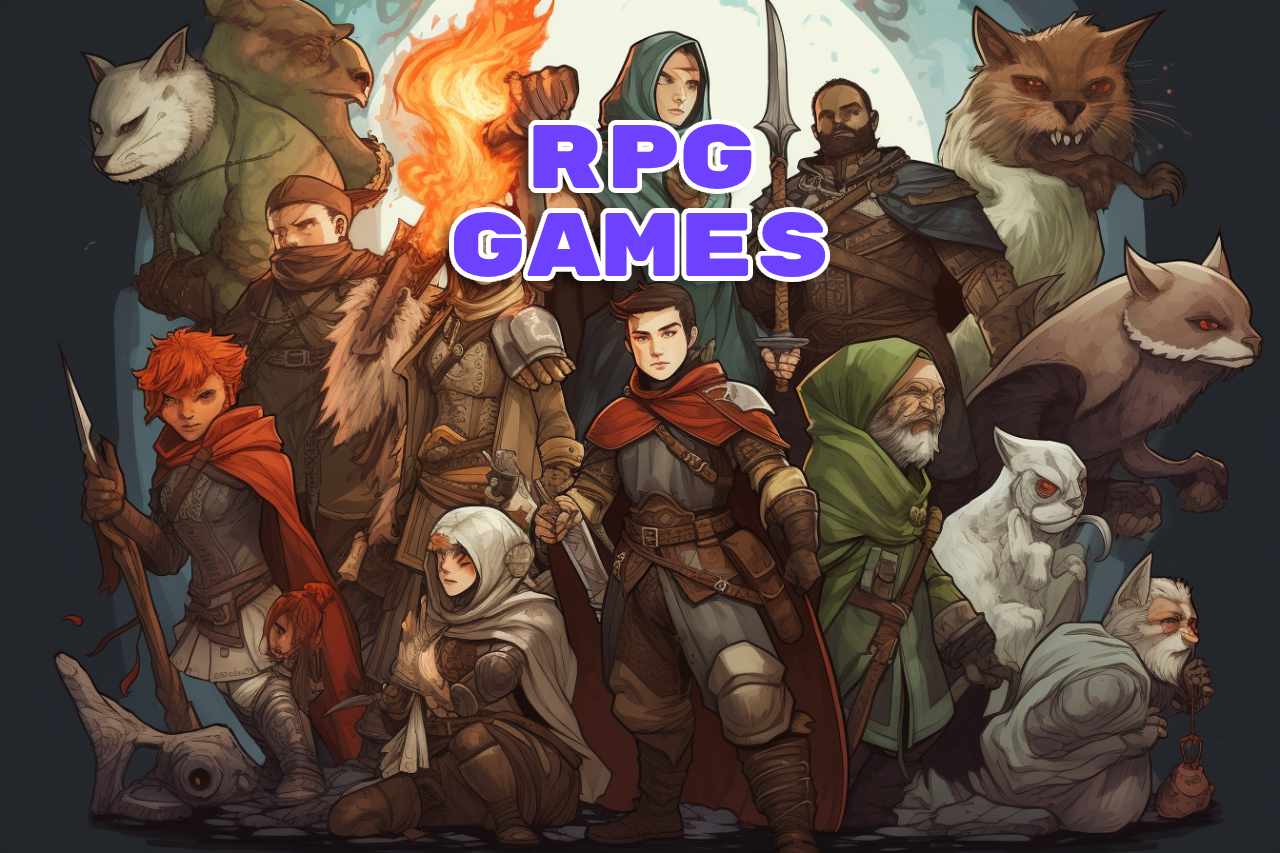Role-playing Games (RPGs) are an interesting genre that lets you play a character and interact within the game’s imaginary world.
The immersive worlds and character-driven narratives of RPGs put you in a large story in which there are many issues that you need to deal with.
Because of their appealing concept, it is not too hard to become popular widely among gamers.
Understanding RPG Games
RPGs may not be the best, but they always have a position among the most popular game genres in the world.
To know the reason why, we should understand basic information about this type of game.
1. Definition and Meaning
So, what are RPG games?
RPGs, as known as Role-playing Games, in which each player becomes a character that takes actions following the game’s story. The environments often set in RPGs can be a fantasy or science fiction world where the character will go through many different happenings.
Therefore, one of the primary mechanics that define the genre is its story and background. Players may have high concentration to look for hidden clues because most RPGs have a deep and complex storyline.
Additionally, character development is another common mechanic in RPGs. Players can choose which appearance or personality of their character and upgrade their characters by completing missions, defeating enemies, exploring the game world, or discovering secrets.
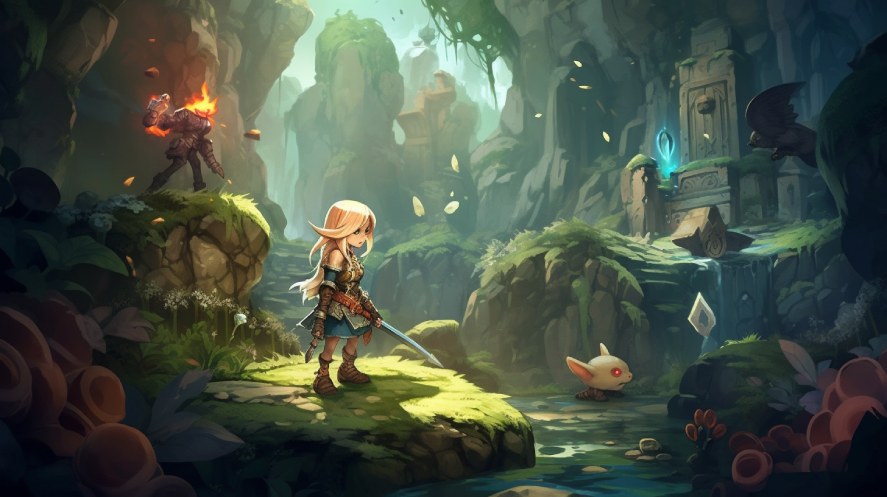
This mechanic may bring players a feeling of satisfaction after conquering a challenge.
Besides, dialogue choices are also known as the core mechanic, in which the player has to make decisions carefully based on the game story’s progression and character’s personalities.
Dialogue choices can have various endings depending on the character’s selection, giving players curiosity, mindful judgment, and excitement.
Exploration and discovery are another important aspect of role-playing games. There is often a massive map in RPGs, in which players can discover new locations and unlock more skills by interacting with different NPCs (non-player characters) or other characters.
This mechanic helps players to be engaged and interested throughout the gạme.
In summary, role-playing games allow players to assume the roles of characters and make impactful decisions. Through the lens of characters, players can have actual experiences of exploration as well as satisfaction.
When they take on the roles of characters, they can explore different personalities and perspectives because the players’ decisions can significantly impact the game’s narrative. Those choices lead to several situations and different outcomes.
2. Types of RPGs: RPG, JRPG, and MMORPG
As time passes, there are some common types of RPGs, such as traditional RPGs, Japanese RPGs (JRPGs), and Massively Multiplayer Online RPGs (MMORPGs).
So, what are the differences between them?
Traditional RPGs are tabletop role-playing games played by a group of players and led by a game master. Each player controls a character and co-operates with others to complete quests and adventures.
Japanese RPGs, as its name suggests, are written and published in Japan, or an RPG is made anywhere but has the style of Japanese role-playing games.
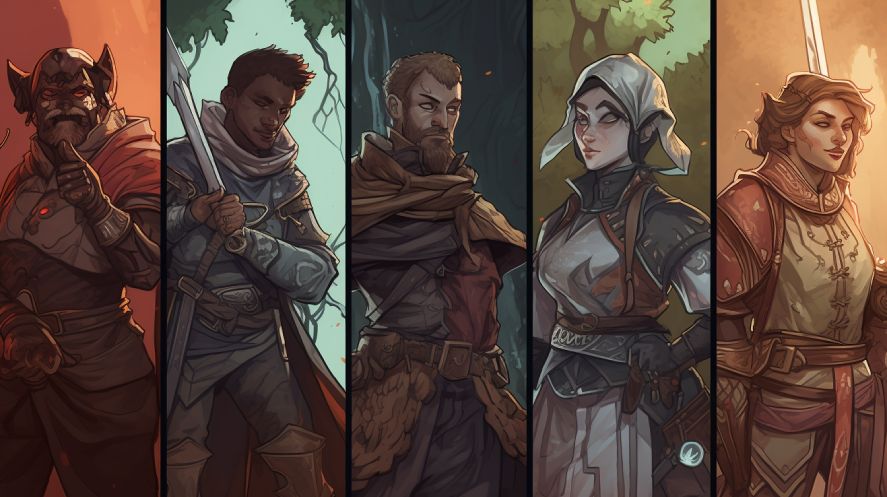
Characters in JRPGs are designed as manga or anime art style, and their gameplay often applies turn-based tactics as well as focus on strategy, personal skill, and teamwork.
Massively Multiplayer Online RPGs create a mini-society that allows players to communicate and exchange with each other in a persistent environment.
The common activity we can see in MMORPGs is that players will connect and build a team up to complete quests or combat with another team. This game’s world is continuously occurring, although players are offline.
All three types of RPGs above have a similar nature to role-playing, but there are key elements that set them apart.
While traditional RPGs are played in person and offer freedom in gameplay, JRPGs concentrate more on storyline and characters.
Meanwhile, MMORPGs offer a persistent world where massive players can explore and interact with others.
The Origins and History of RPG Games
The development of RPGs has come a long way with many remarkable events.
The following will briefly present when and how we have RPG Games nowadays.
1. Early Beginnings
The very first role-playing game appeared in the mid-late 1970s and was known as a small branch of computer games in colleges.
They were played on PDP-10, PLATO, and Unix systems. In 1974, based on the foundation of wargames, Arneson associated with Gygax to make the first “Dungeons & Dragons” games, which TSR published – Gygax’s company, and quickly gained a massive following.
Then, other pen-and-paper RPGs with different genres were introduced from 1974 to the early 80s, like Tunnels and Trolls (1975), Empire of the Petal Throne (1974/75), Chivalry and Sorcery (1977), Traveller (1977), Superhero:2044 (1977), Dragon Magazine (1976),…
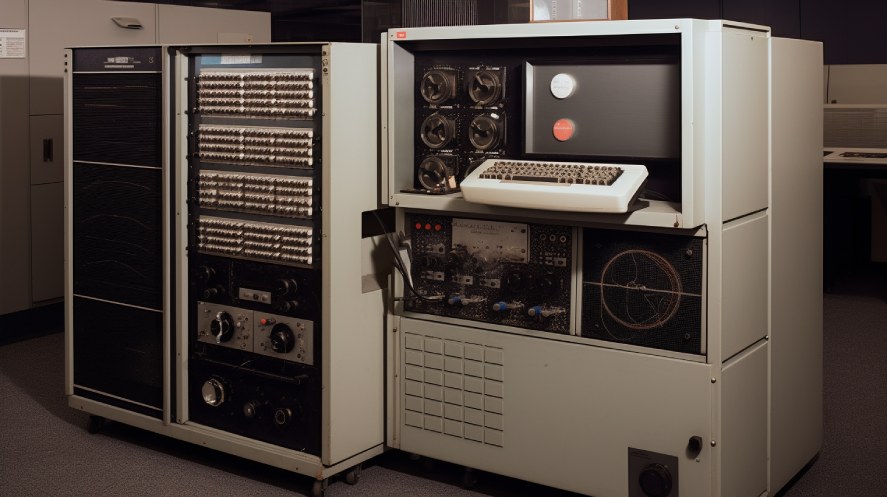
From the mid-1980s to the early 90s, there was competition among various settings and systems because of the innovation of game settings and rules.
Along with the popularization of home computers, role-playing video games also were common.
These games were influenced strongly by pen-and-paper RPGs because they owned almost all key elements of pen-and-paper games, such as developed storytelling, player character development, narrative elements, turn-based combat, etc.
2. Milestones in Video Game RPGs
With the growth of role-playing video games, significant series in computer game history were born during the late 1980s to mid-1990s: Ultima, Wizardry, and Might and Magic.
They typically consist of complex and dynamic character interaction, so technological advancements played an important role in expanding the possibilities of RPG game design.
Thanks to that, players can have more immersive and engaging experiences.
In 1993, a successful role-playing game called Magic: The Gathering was released, which sold out of 10 million cards. This led to a new type of collectible card game emerging.
After that, the first chapter of The Elder Scrolls role-playing video game series was released in 1994, which was an attemption at creating a true pen-and-paper style experience for personal computers.
Those titles helped to push the boundaries and captured players’ imaginations.
Celebrated RPG Games Over the Years
RPGs have been through for decades and had many proud achievements.
In this part, we will take a look at some celebrated RPGs over the years from classic to modern.
1. Classic RPG Titles
There are many classic RPG titles that left a lasting impact on the game industry such as “Final Fantasy VII”. “The Elder Scrolls: Morrowind”, and “Baldur’s Gate”.
These iconic titles have been so popular until now because of their interesting plots, unique features, and spectacular visuals. They also paved the way to launch new game mechanics like branching storylines, complex characters, and multiple endings.
Based on what they have done for the game industry, it’s not too overrated to say that they are a staple of the RPG genre.
2. Modern RPG Masterpieces
Following in the footsteps of the classic RPGs, more modern RPGs were born and some of them became masterpieces in this genre such as “The Witcher 3: Wild Hunt”, “Dark Souls”, and “Mass Effect”.
These titles inherit the advantages of iconic RPGs and explore more aspects by using artless graphics for their characters, creating a wider open game world, and offering dynamic combat systems.
With the potential to be successful in the long term, these modern RPGs not only continue to evolve the RPG formula but also resonate with a new generation of players.
Through their diversity and inclusivity, they have responded to the changing of the gaming industry and inspired more game developers.
The Development of RPG Games and Game Publishing
The development of role-playing games has come a long way and met many challenges to complete and publish.
1. Evolution of Action RPGs
“Dragon Slayer”, “Hydlide”, and “Courageous Perseus”, which were released in 1984, are believed to be the earliest action RPGs.
Japanese developers created a new brand of action RPG combining arcade-style action and action-adventure elements, while most of the mechanics of Western RPGs are turn-based.
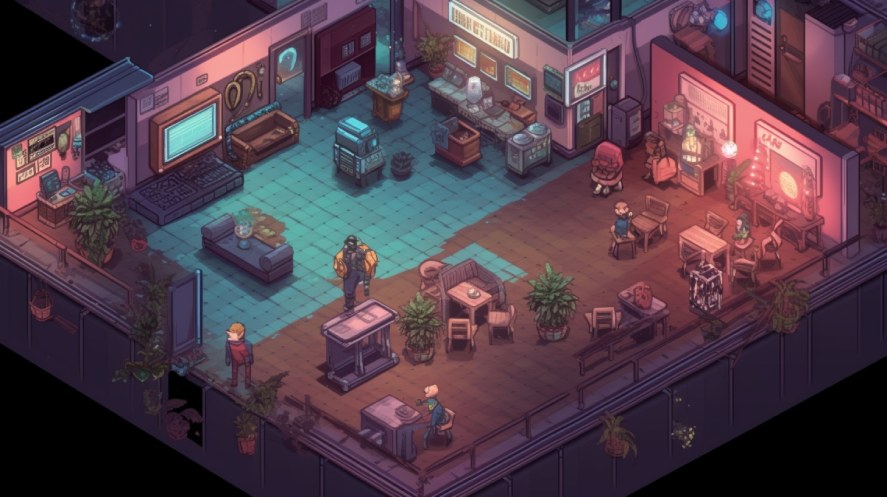
These action RPGs offer the ability to control a single character in real-time combat. They combine key elements from both traditional RPGs and action games. Action RPGs were immensely popular during the late 80s.
In the year afterward, the role-playing game industry declined due to some reasons: role-playing video games were sluggish, some prior companies had financial trouble and were bought by other companies.
Meanwhile, a successful action RPG title was named “Diablo” (1997). This game series became popular because of its unique graphic quality, rich environments, and superb gameplay mechanics.
In the early 2000s, other common action RPGs were born, such as “Kingdom Hearts” (2002) and “Nier: Automata” (2017) gained much commercial success.
2. Challenges in RPG Game Development
That’s not easy when developing a game, especially role-playing games, which contain a mass of systems and settings. Developers need to prepare for the challenges in RPG Game development.
One of the most important missions of role-playing game developers is to balance gameplay and story. Expansive worlds, intricate narratives, and dynamic character progression are so complex.
The game environment needs to be huge and an open world with plenty of elements for players to explore and discover freely.
On the other hand, the story and characters also need to be cohesive and fit well with the gameplay to make sure they complement each other.
3. Publishing and the RPG Market
A role-playing game will not be as popular as it is now without game publishers. They have the resources and experience to support the developers. A game is made with many costs, and publishers will have the financial backing to cover them.
Besides, marketing plays a crucial part to deliver the games to the community, publishers may have more effective marketing strategies as well as relationships with distributors and retailers which make the games stand out in the market.
Along with the technology’s development, many digital distribution platforms appear and supply more chances to independent developers to get their games to reach a large audience.
Parallely, RPG fans will discover and experience more new games. This impulses creativity and innovation in the RPG genre.
Why People Love to Play RPG Games
RPGs have their certain reasons that make players keen on them.
One of them is that RPGs provide both psychological and emotional satisfaction. Players can have their own world to control, set up, and make choices. This makes them feel so powerful because they have real impacts in the game world.

Furthermore, character progression is also an element to keep players coming back for more. They develop their characters from weak and vulnerable to strong and expert.
That sense of satisfaction makes players comfortable and keeps their minds off problems in real life. Also, RPGs are a way of teaching players critical thinking and problem-solving with their team effectively.
The Future of RPG Games
RPGs have been a staple of gaming for decades, and it hoped to grow stronger in the future.
Advancements in technology, AI, and player-driven narratives are the factors which may shape the future trends and innovation in the RPG genre.
We can think of a more immersive and realistic game world; characters with the smallest detail could be made lively and react to the player’s action in real time, or AI would create endless quests and environments that extend various abilities and unpredictable experiences.
Conclusion
It’s not a lie to say that RPGs have become one of the most beloved game genres today because of their appeal and versatility.
They have all the factors to attract a new gamer, like rich and engaging worlds, realistic and memorable characters, and interesting and diverse quests.
RPGs have existed since the beginning, so they have an important role in the gaming industry. RPGs influence many other genres of games and adapt across all forms of media, from books to TV shows.
Moreover, they have the ability to transport players to captivating realms of adventure and exploration, make them feel like they are a part of the story, and give them many hours of excitement and relaxation because players can temporarily escape their boring world and satisfy their hidden wishes.
In conclusion, RPGs offer amazing and significant experiences that few other games can match, and with their potential, the future of RPGs is so bright and exciting.

